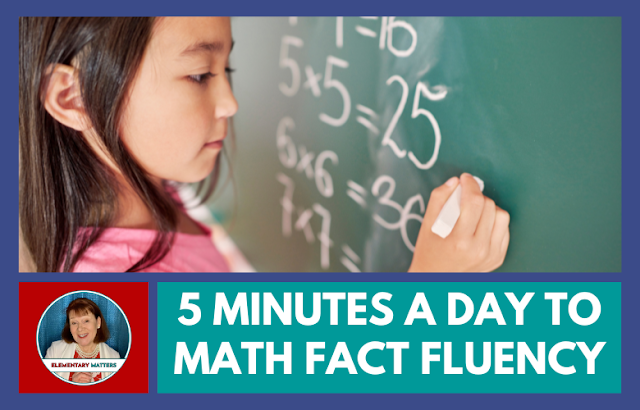After many years in the primary classroom, I've finally developed a sure-proof system for math fact fluency.
Before this can happen, the children need to have a basic understanding of what it means. A child can't memorize 5+2=7 unless they understand they are joining a set of 5 items to a set of 2 items and will end up with 7 items. Once they have that understanding, they can start the memorization process. Once the facts are fluent, the related math concepts will flow far more easily!
Yes, rote memorization is NOT the most fun part of learning.
Yes, it takes work, and some students really struggle, but we recognize that they're all different and can help them achieve success at their own pace.
Here are some suggestions for math fact fluency!
There are 200 Addition and Subtraction facts to be memorized. There are also 200 Multiplication and Division facts to be memorized. Children can be easily overwhelmed if given that many facts all at once!
Give them a pattern of facts to learn at a time. Research indicates that children learn best through fact families.
Each child should have a group of facts they are working on and a group of facts they know and don't want to forget. Ensure they spend time reviewing the old facts and learning the new ones.
Be up front with the students. Talk about memorization and how they need to do the work to memorize the facts. Share the differences between automaticity and "counting on fingers" or "figuring it out in your head." (I don't believe counting on fingers or mental math to be bad, as they are part of the process! However, we hope to get the kiddos to full automaticity eventually!)
Talk to them about what has helped you when you had to memorize something, and encourage them to share their own memorization experiences. We're all different, but sharing ideas will help everyone! (Isn't that our goal? Teaching children to help each other so we are all successful?)
Or as I call it in my classroom, "out soft." That means loud enough to hear yourself, but not loud enough to disturb your classmates. Verbalizing the entire equation, not just the answer, makes a significant difference in the learning process.
Practice with friends: Children are social, and practicing with a classmate makes it more fun. Some individuals tend to be competitive; let that work for them, as long as everyone is satisfied with it. Additionally, children learn little tricks from one another. (Yes, I've learned a lot of little tricks from listening to my students!)
Timed tests can be motivating for many, but there are others who "choke" under that stress. You know your students better than anyone. I give timed tests once a week, but if I see any signs of stress, I'll pull that child aside and work with them. I make it fun, but when one-on-one, I can clearly see if a child is counting on fingers, pausing to figure it out in their head, or truly has the facts memorized. No matter what, I ensure it is a positive experience, with lots of praise for the things the child is doing correctly.
When I feel a child is ready to move to the next level, before school starts, I'll put the next level of practice cards on their desk for them to cut out and sort. You'd better believe there are shrieks of delight when they are found! I'm sure you know plenty of other ways to celebrate their successes as well!
I spend time at the beginning of the school year setting routines. There are several ways to practice the facts: everyone can practice on their own, as part of math rotations, small group games, on computers or devices, with a teacher or adult helper, and so on! I usually teach the routines using "easy facts" before we get to the tougher ones. Once the routines are set, they're good to go!
Once a student has proved mastery of all the levels of addition and subtraction, I might have that child review all the levels again. Another option is to move on to multiplication and division. Although mastery of these facts isn't necessary for first—or second-graders, those students who master addition and subtraction quickly are usually quite ready for the upper levels. (Just make sure they understand what it all means!)
Another option is to have them work with others. Perhaps it's because my dad was a football coach, but I've always felt it's our job to look out for the whole "team," and that concept is well instilled in my students. We have not succeeded until we have all succeeded!
These are my foolproof systems for both levels. I swear by these materials! I've used them for years and found them to be successful (and loved) by both students and teachers.
Addition and Subtraction Facts:
Fact Fluency System for Addition and Subtraction: The Bundle
Multiplication and Division Facts:
Fact Fluency System for Multiplication and Division: The Bundle
Or get them both in this bundle:
Math Fact Fluency System: the Bundle
Try the first level of each system for free!
Math Fact Fluency Practice Activities and Assessments: Level One X1 Fact Families
Try these related digital resources!
Addition and Subtraction Fact Fluency Boom Bundle
Multiplication and Division Fact Fluency Boom Bundle




















